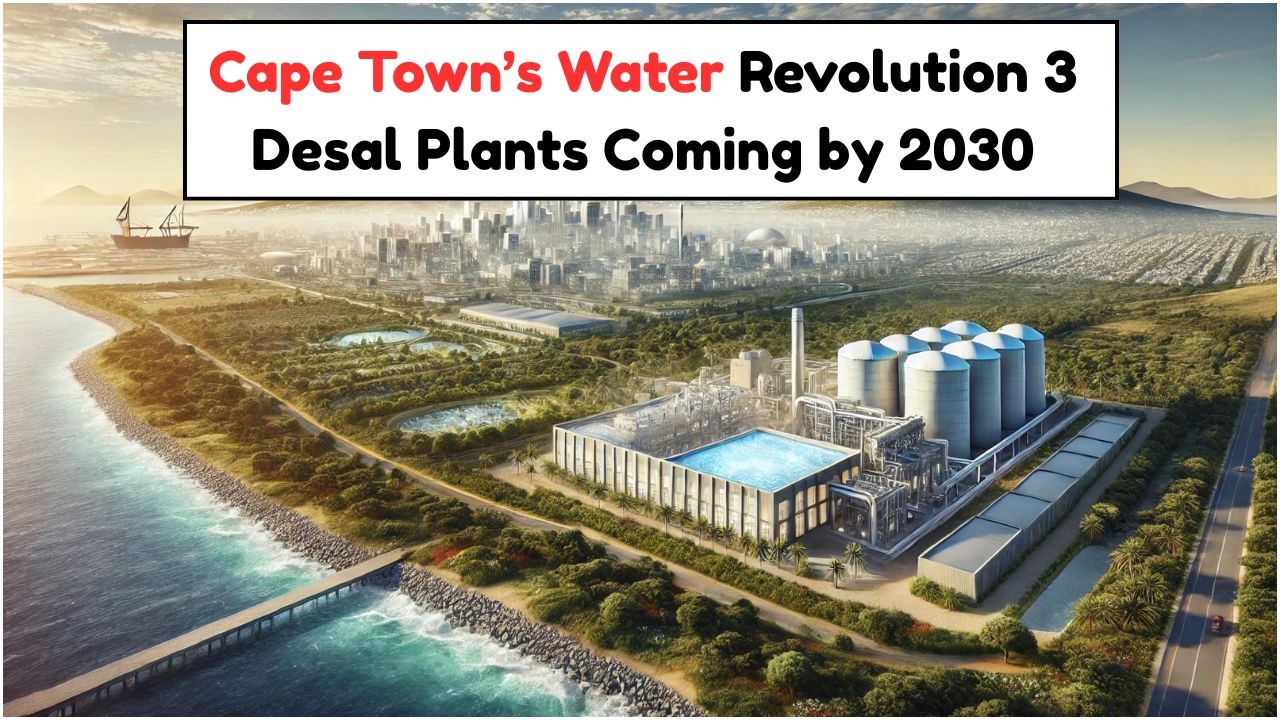Cape Town’s Water Revolution: Three Desalination Plants to Slash Costs by 2030: As Cape Town continues to grapple with the challenges of drought and water scarcity, the city is embarking on a groundbreaking initiative to transform its water supply system. By 2030, Cape Town plans to establish three state-of-the-art desalination plants aimed at significantly reducing water costs and ensuring a sustainable supply for its residents. This revolutionary project not only promises to secure water availability but also aims to ease the financial burden on households and businesses alike. With the rising demand for water, these desalination plants are set to become a cornerstone in Cape Town’s strategy to combat water shortages while promoting economic and environmental sustainability.
The Impact of Desalination on Cape Town’s Water Supply
In recent years, the Western Cape has faced severe droughts that have put immense pressure on its water resources. Desalination offers a promising solution by converting seawater into potable water, providing a reliable alternative to traditional water sources. The introduction of these desalination plants is expected to significantly bolster Cape Town’s water supply, mitigating the risks associated with climate change and unpredictable rainfall patterns.
- Increased water availability for domestic and industrial use
- Reduction in reliance on rain-dependent water sources
- Potential for Cape Town to become a leader in water sustainability
- Job creation during the construction and operation phases
- Enhanced resilience against future droughts
Economic Benefits of the Desalination Initiative
Beyond providing a stable water supply, the desalination plants are projected to offer substantial economic benefits. By reducing the costs associated with water shortages, businesses can operate more efficiently, and households can enjoy lower utility bills. Additionally, the construction and ongoing operation of these plants are expected to create numerous jobs, boosting the local economy and providing new opportunities for skilled and unskilled workers alike.
| Year | Water Production (MLD) | Cost Reduction (%) |
|---|---|---|
| 2025 | 150 | 10 |
| 2027 | 250 | 15 |
| 2030 | 400 | 25 |
Environmental Considerations and Challenges
While desalination presents numerous advantages, it is not without environmental challenges. The process requires significant energy, which can lead to increased carbon emissions if not managed sustainably. To address this, Cape Town is exploring renewable energy options to power the plants, aiming to minimize the environmental footprint and align with global climate goals.
 Thousands Stranded by August NSFAS Blockages: Discover the Viral R5,200 WhatsApp Hack to Solve It
Thousands Stranded by August NSFAS Blockages: Discover the Viral R5,200 WhatsApp Hack to Solve It
- Utilization of solar and wind energy to power desalination processes
- Implementation of energy-efficient technologies
- Minimization of brine discharge impacts on marine ecosystems
- Collaboration with environmental organizations for sustainable practices
Community Engagement and Support
Community involvement and support are crucial for the success of the desalination project. The city is actively engaging with local communities to raise awareness about the benefits and potential impacts of the initiative. Public consultations and educational campaigns are being conducted to ensure transparency and foster a sense of ownership among residents.
| Event | Date | Location | Purpose |
|---|---|---|---|
| Public Workshop | Jan 2024 | City Hall | Discuss project benefits |
| Environmental Forum | Mar 2024 | Community Center | Address ecological concerns |
| Job Fair | May 2024 | Convention Center | Recruit for plant operations |
Technological Innovations in Desalination
Technological advancements play a pivotal role in enhancing the efficiency and sustainability of desalination processes. Cape Town’s plants will incorporate cutting-edge technologies to optimize water production while minimizing environmental impacts. Innovations such as reverse osmosis and energy recovery systems are set to revolutionize desalination, making it more viable and eco-friendly.
- Advanced filtration techniques for improved water quality
- Energy recovery devices to enhance efficiency
- Smart monitoring systems for real-time plant management
- Research partnerships with academic institutions
Infrastructure and Investment
| Sector | Investment (ZAR) | Expected Output |
|---|---|---|
| Construction | 3 Billion | Job Creation |
| Technology | 1.2 Billion | Innovation |
| Energy | 800 Million | Sustainability |
Future Prospects for Cape Town’s Water Security
As Cape Town looks towards the future, the implementation of desalination plants represents a significant step towards achieving long-term water security. By 2030, the city aims to not only meet its water demands but also set a benchmark for other regions facing similar challenges. The success of this initiative could pave the way for broader adoption of desalination technologies across South Africa, fostering resilience and sustainability in the face of climate change.
| Milestone | Timeline | Impact | Details |
|---|---|---|---|
| Plant 1 Completion | 2025 | Increased Supply | Boosts capacity |
| Plant 2 Launch | 2028 | Cost Savings | Reduces expenses |
| Plant 3 Operational | 2030 | Environmental Benefit | Eco-friendly operations |
FAQ: Cape Town’s Desalination Initiative
What is the primary goal of the desalination plants?
The primary goal is to provide a sustainable and reliable water supply by converting seawater into potable water, thereby reducing reliance on rain-dependent sources.
How will the desalination plants affect water costs?
The plants are expected to significantly reduce water costs by ensuring a stable supply, leading to lower utility bills for households and businesses.
What environmental measures are being taken?
Cape Town is exploring renewable energy options and implementing eco-friendly technologies to minimize the environmental impact of desalination processes.
 Eastern Cape School Shuts Down Amid #JusticeForCwecwe Uproar: Parents Call for Immediate Action
Eastern Cape School Shuts Down Amid #JusticeForCwecwe Uproar: Parents Call for Immediate Action
How will the local community benefit from this initiative?
The project is expected to create jobs, boost the local economy, and provide a reliable water supply, improving the overall quality of life for residents.









